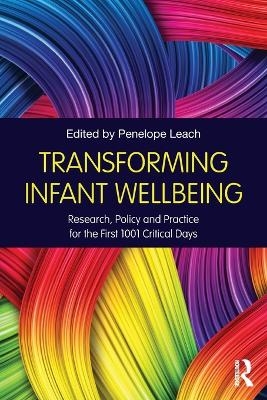
Transforming Infant Wellbeing
Routledge (Verlag)
978-1-138-68954-1 (ISBN)
This book has a two-fold purpose in science and in social policy. First, to collect new papers by leading scientists in a single volume, which ensures they reach a broad audience. Second, by introducing and commenting on the significance of these new findings, the book highlights both the benefits that accrue to society when it acts accordingly, and the costs, financial and social, of our failure to do so.
In the last 50 years, interest in infant development and especially maternal and infant mental health has burgeoned. A large number of issues at the forefront of child development research mirror those of yesterday, but the research brought to bear upon them has transformed. Thanks largely to technological and statistical advances, we now know a great deal that researchers of earlier generations could only surmise. However, increasing knowledge of infancy has not been matched by an increasing impact on parents and professionals, politicians and policy makers. Bringing contemporary studies involving pregnancy, birth, infancy and toddlerhood together, along with the undisputed evidential findings that flow from them, large gaps between what is known and what is done become apparent. By focusing on what can be done to fill those gaps, Transforming Infant Wellbeing renders inescapable the need to rethink current priorities. It represents essential reading for researchers, parents and policy makers of infancy.
Penelope Leach is a research psychologist specalising in infant development. She is a fellow of the British Psychological Society and a Senior Research Fellow of the Institute for the Study of Children, Families and Social Issues, Birkbeck, University of London and of the Tavistock and Portman NHS Trust. She is a Visiting Professor at the Faculty of Education, University of Winchester.
Preface
Acknowledgements
Part I. Issues in infant wellbeing
Fifty years of childhood
Penelope Leach
Changing society’s attitudes to children and families
Al Aynsley-Green
Part II. Evidence
A: Early experiences and later outcomes
3. Circuits and circumstances: importance of earliest relationships and their context.
Robin Balbernie
4. Attachment theory: research and application to practice and policy
Pasco Fearon
5. Maternal representations in pregnancy: importance of the mothers' relationship with their unborn babies
Jane Barlow
6. Keeping the baby in mind: new insights into the links between maternal childhood trauma, mental health problems in pregnancy and outcomes for the child
Susan Pawlby, Dominic Plant, Carmine M. Pariante
7. Postnatal depression and the under-twos
Lynne Murray and Peter Cooper
B: Perinatal Risk Factors with demonstrable long-term ill-effects
8. Health inequalities and the importance of action on perinatal risk factors
Angela Donkin and Michael Marmot
9. Stacked odds: how social background can stifle early child potential
Chris Cuthbert
10. Antenatal and postnatal mental health problems: prevention and treatment
Alain Gregoire
11. Stress in pregnancy can change fetal and child development
Vivette Glover
12. Birth trauma
Diane S. Speier
C. Policies with potential to reduce risks and improve outcomes
13. Investing in early human development
Mary E. Young
14. What makes a difference? Supporting families in caring for children
Peter Fonagy
15. Evidence-based interventions for the first 1001 days
Kirsten Asmussen, Leon Feinstein, Haroon Chowdry, Jack Martin
16. Transforming infancy through paternity and parental leave
Margaret O’Brien
17. Towards an evidence-based population approach to supporting parenting in the early years
Matthew R. Sanders and Alina Morawska
D: Specific Programmes Demonstrating Improved Outcomes
18. Relationship-based interventions in the early years
Robin Balbernie
19. Child protection in the community: recognising and responding to signs of neglect
Ruth Gardner and Camilla Rosan
20. Mellow programmes for especially vulnerable parents and parents-to-be
Christine Puckering
21. Fathers in the perinatal period: taking their mental health into account
Jill Domoney, Jane Iles, Paul Ramchandani
22. 'SafeCare', the case for parent--infant language training
Angie S. Guinn, John R. Lutzker, Mark Chaffin
23. Video Interaction Guidance: promoting secure attachment and optimal development for children, parents and professionals
Hilary Kennedy and Angela Underdown
24. Life is 'like a box of chocolates': interventions with special-needs babies
Stella Acquarone
Part III Action
25. Themes arising
26. Norfolk Parent-Infant Mental Health Attachment Project (PRIMAP): working towards integration in attachment, mental health and social care
Verity Smith, Richard Pratt, Catherine Thomas and Danny Taggart
27. Building research findings into policy and policy into action
Timothy Loughton
| Erscheinungsdatum | 30.01.2018 |
|---|---|
| Zusatzinfo | 12 Tables, black and white; 21 Line drawings, black and white; 22 Illustrations, black and white |
| Verlagsort | London |
| Sprache | englisch |
| Maße | 156 x 234 mm |
| Gewicht | 420 g |
| Themenwelt | Sachbuch/Ratgeber ► Gesundheit / Leben / Psychologie |
| Geisteswissenschaften ► Psychologie ► Entwicklungspsychologie | |
| Geisteswissenschaften ► Psychologie ► Familien- / Systemische Therapie | |
| Geisteswissenschaften ► Psychologie ► Psychoanalyse / Tiefenpsychologie | |
| Medizin / Pharmazie ► Gesundheitswesen | |
| Medizin / Pharmazie ► Medizinische Fachgebiete ► Pädiatrie | |
| Medizin / Pharmazie ► Medizinische Fachgebiete ► Psychiatrie / Psychotherapie | |
| ISBN-10 | 1-138-68954-8 / 1138689548 |
| ISBN-13 | 978-1-138-68954-1 / 9781138689541 |
| Zustand | Neuware |
| Informationen gemäß Produktsicherheitsverordnung (GPSR) | |
| Haben Sie eine Frage zum Produkt? |
aus dem Bereich


